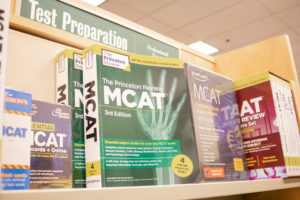How To Prepare for the MCAT So You Can Ace It
All journeys begin with a single step, and for the medical profession, that first step is the Medical College Admission Test, or MCAT. The test itself is no mere formality, since how well you do on the MCAT is a strong indicator of your success in medical school. In this article, we’ll give you some of the most useful tips for how to study for the MCAT, and help kickstart your medical career.

How to study for the MCAT
The MCAT is a computer-based, 7.5 hour multiple-choice exam that tests your knowledge in the physical and biological sciences, as well as your verbal reasoning skills and writing ability.
Your MCAT score is one of the most important factors in your medical school application. Medical school admissions committees will primarily focus on your MCAT score, your performance in pre-medical coursework in college, and your undergraduate GPA to gauge how well you’ll adapt to the rigors of medical school and clinical training. Soft factors such as extracurricular and volunteer activities are also taken into account.
The MCAT is the one part of the application that’s standard across all applicants, so it has a particular importance in making admissions decisions. Because of this strong influence, it pays to be well-prepared for this exam. Here are a few things to keep in mind when studying for the MCAT.
Know what to expect.
The saying “knowing is half the battle” rings especially true when it comes to taking exams. Knowing exactly what content the MCAT covers is critical to your preparation plans, and thus to your ultimate success on the exam. Becoming familiar with the exam will help you to plan how to study for the MCAT.
The MCAT covers General and Organic Chemistry, General Biology, Biochemistry, Sociology, Psychology, and Physics. It also assesses your critical analysis and reasoning skills.
The subjects covered by the MCAT fall into four main sections:
Chemical and Physical Foundations of Biological Systems
The Chem/Phys section of the MCAT is 95 minutes long and consists of 59 total questions; 44 of these are passage-related questions, and 15 are standalone questions. Because the majority of questions are passage-related, it is important for a test-taker to understand that the right answers to these questions require information from the passage as well as knowledge in the basic and medical sciences.
The questions in this section will assess your ability to understand the chemical and physical principles that form the foundation of the processes and functions of the human body. The primary undergraduate coursework that will be critical to your success in this section includes General Chemistry I & II, Physics I, Organic Chemistry I, and Biochemistry I.
You will have access to a periodic table while answering questions in this section of the MCAT.
Biological and Biochemical Foundations of Living Systems
The Bio/Biochem section of the MCAT consists of 59 total questions and is 95 minutes long. 44 of the 59 questions are passage-related questions, and 15 are standalone questions. As with the Chem/Phys section, the right answers to passage-related questions require information from the passage as well as outside content knowledge.
This section tests you on the life processes that make living organisms unique, such as reproduction, homeostasis, and acquiring materials and energy. The primary undergraduate coursework most useful to success in this section is primarily Biology I & II, Biochemistry I, General Chemistry and Organic Chemistry. Cellular and Molecular Biology, Anatomy & Physiology, and a basic knowledge of statistics will also be helpful.
You will have access to a periodic table while answering questions in this section as well.
Psychological, Social, and Biological Foundations of Behavior
The Psych/Soc section of the MCAT also consists of 59 questions, which you get 95 minutes to complete. This section tests your understanding of the ways in which psychological, biological, social and socio-cultural factors influence how different individuals interact with and perceive themselves, as well as the environment and world around them. This section is the newest material on the MCAT primarily because of its increased importance in medical education; there is an increased awareness that social stratification and access to resources have a significant impact on a medical patient’s well-being, and future physicians need to recognize the various dimensions of social issues in medicine.
The most useful undergraduate coursework for success in this section is introductory psychology and sociology. General Biology will also be useful, especially concepts that relate to mental processes and behavior. Furthermore, it will be important for you to apply your knowledge in research methods and statistics to the social and behavioral sciences.
Of the 59 total questions in the Psych/Soc section, 44 are passage-related questions, and 15 are standalone questions. As with previous sections, the right answers to passage-related questions require information from the passage as well as outside content knowledge.
Critical Analysis and Reasoning Skills
The critical analysis and reasoning skills, or “CARS,” portion of the exam is 90 minutes long and consists of 53 questions. This section evaluates your reading comprehension, analysis and reasoning skills by testing your ability to critically analyze information provided in the passages. Particularly, it assesses your ability to analyze arguments, identify assumptions and inferences, connect the various ideas and theories that appear throughout the passage, and understand the authors’ point of view.
Unlike in the other sections, the CARS section doesn’t require any specific prior content knowledge. All of the information needed to answer each question can be found in the relevant passage. Each passage is about 500-600 words, and could be related to any discipline from the social sciences and humanities. This section is not about content, but about reasoning ability.
Identify your weaknesses.
Once you know the material that the MCAT is going to cover, you should dedicate time to evaluating your strengths and weaknesses across the various MCAT sections. To make an efficient and focused study plan, it’s critical that you honestly and accurately identify your weaknesses. This will allow you to focus your studying on the areas where you most need to improve. Subjects and topics that you are not entirely comfortable with need to be drilled extensively and early on, while those that you already know well won’t require as much time.
Create a study plan that connects concepts.
A lot of the coverage of the MCAT is interconnected. Biology, Biochemistry, Chemistry, Organic Chemistry and Physics are major subject areas of the MCAT. Knowing how these subjects relate to each other will help you answer the test questions more easily.
Create a study plan that helps you to see the relationships between the subjects that you cover. Rather than studying each subject in isolation, spend some time looking at the connections between them. This will also improve the flow of your review and allow you to understand concepts faster.
Repetition, repetition, repetition.
Memorization requires repetition. Flashcards may seem like a basic concept, but they’re extremely useful. If you want a modern take on the flashcard concept, you may want to try Anki. It’s a flashcard app that can be installed on a PC, tablets, or mobile, and uses spaced repetition to enhance learning so that you can memorize more efficiently. Once you have the Anki app, you can download flashcard decks for anything that you want to learn; there are a number of decks out there for MCAT review. (Many medical students also rely on Anki, to help them achieve success during their medical school coursework and on their board exams.)
If you prefer making physical flashcards, then that’s great too – just make sure that you spend enough time using them to get the benefits.
Don’t be afraid to ask for help.
With any challenge that you may be facing, there’s a very good chance that someone somewhere has already gone through it before you. This is very much true with the MCAT. You’re not the first person to face this hurdle. Don’t be afraid to ask people who have already aced the exam for tips about preparing for it. Most pre-med and medical students enjoy helping others and are happy to share.
Sites like Medlearnity offer online tutoring with experts in the medical field that have invaluable knowledge for taking the MCAT. One way to gain a significant edge on the MCAT is to take advantage of this resource and start taking a personalized MCAT tutoring course.
Doing well on the MCAT is definitely all about preparation. Knowing what to study and how to study will improve the efficiency of your time, and the effectiveness of your learning and knowledge retention. Working with a tutor who understands the exam, provides you with invaluable study tips, and keeps you on a focused study schedule will put you on the right path to success.
If you’re curious about what it’s like to work with a tutor, you can try out a free trial session.

